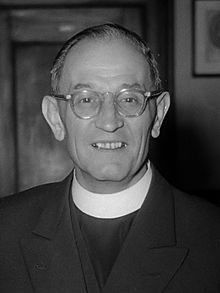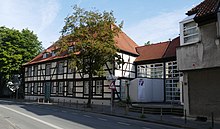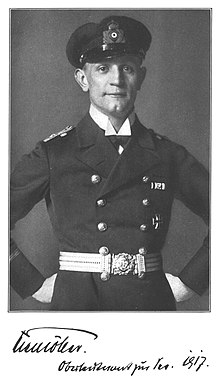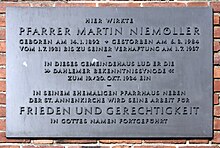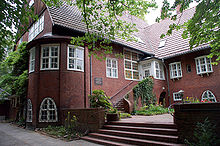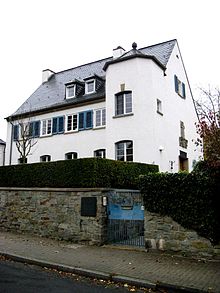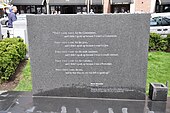Martin Niemöller
Emil Gustav Friedrich Martin Niemöller (born January 14, 1892 in Lippstadt ; † March 6, 1984 in Wiesbaden ) was a German Protestant theologian and leading representative of the Confessing Church as well as church president of the Evangelical Church in Hesse and Nassau and president of the World Council of Churches . While he was initially positive about National Socialism , during the church struggle and from 1938 as a prisoner in the Sachsenhausen concentration camp, he gradually developed into a resistance fighter against National Socialism . After 1945 he was committed to a reorganization of the Evangelical Church and appeared in the peace movement .
Life
origin
Niemöller's parents were the Lutheran pastor Heinrich Niemöller (1859–1941) and his wife Paula, b. Müller (1868-1956). The Bielefeld pastor and later church historian Wilhelm Niemöller (1898–1983) was his brother, the evangelical pastor Rudolf Bäumer his cousin. In 1900 the family moved from Lippstadt to Elberfeld (now part of Wuppertal ), where he passed his Abitur at the Evangelical Gymnasium in 1910.
Naval officer in the German Empire
After graduating from high school, Niemöller embarked on an officer career in the Imperial Navy . First he was stationed as a midshipman on the SMS Hertha and later on the SMS Thuringia . From 1915 he was a member of the submarine weapon. In October he became an officer on watch on the submarine lifting ship Vulkan , was later trained as a submarine driver on U 3 and was appointed second officer on watch on U 73 in February 1916 . In April 1916, U 73 was relocated to the Mediterranean, where it fought on the Salonika Front , broke through the Otranto Barrier several times and from December 1916 laid mines in front of Port Said and waged a trade war. From January 1917, Niemöller drove as a helmsman on U 39 under the command of Walter Forstmann and together with Karl Dönitz , then he came back to Kiel and was awarded the Iron Cross 1st class.
From August 1917 he was first officer on the U-cruiser U 151 , which attacked and sank numerous steamers near Gibraltar , in the Bay of Biscay and in many other places. In November, U 151 was deployed in front of the port of the Senegalese Dakar . On board one of the ships in the port of Dakar was the later Nobel Peace Prize laureate Albert Schweitzer , who, as an Alsatian and thus an Imperial German at the time , had been interned in Gabon in France with his wife and was now waiting with other internees to be shipped to France. This is evidenced by an exchange of letters with Niemöller at the end of the 1950s, which Schweitzer resolved: Dear Mr. Niemöller, So you actually ambushed me and tried to kill me. If you had succeeded, you would now have one good friend less in the anti-nuclear fight. Since it happened that way, we want to stick together all the better. Your devoted Albert Schweitzer
In May 1918, Niemöller became the commander of the UC 67 mining submarine . He undertook two enemy voyages, during which he sank three steamers and laid mines off Marseille. In July 1918, his submarine was badly damaged in an air raid. In 1919 Niemöller said goodbye because he rejected the new democratic government . In 1920 he served as a battalion leader in a volunteer corps (3rd battalion of the Academic Wehr Münster ).
Training and pastoral office in the Weimar Republic
On April 20, 1919, he married Else Bremer (1890–1961). In the same year, Niemöller worked on a farm in Westerkappeln near Osnabrück from May to October because he planned to become a farmer himself. Since there was not enough money to buy his own homestead, he decided to study Protestant theology in Münster (1919–1923). During this time he was intensively involved in various right-wing extremist organizations. The motivation for studying was his endeavor to restore meaning to the apparently disoriented society through the Christian message and order through the church structures. He also performed the vicariate in Munster.
During the suppression of the Ruhr uprising in 1920, Niemöller was in command of the III. Battalion of the Freikorps Akademische Wehr Münster against the insurgent workers of the Red Ruhr Army in action. During his studies he joined the student group of the German National People's Party , of which he was chairman for about a year. In the summer of 1920 he became a member of the Deutschvölkischer Schutz- und Trutzbund .
During his time in Münster, Niemöller's acquaintance with the later General Field Marshal Walter Model, who later resided there, also fell .
Since 1924 he elected the NSDAP .
In 1924 he became a chaplain of the Westphalian Inner Mission . In 1927, Niemöller co-founded the self-help organization "Loan Cooperative of the Westphalian Inner Mission eGmbH", a predecessor of today's Bank for Church and Diakonia eG - KD-Bank. In 1931 Niemöller became III. Pastor of the Evangelical Church Community Berlin-Dahlem appointed. It was the pastor's office for the newly built and consecrated Jesus Christ Church in 1932 .
In Berlin in 1932, Niemöller and Model, now a major, met again - the pastor was "always welcome at the Model house". The Protestant churchgoer Model - often in discussion with Niemöller - later also rejected the pronational socialist "German Christians".
Church fight 1933–1937
Soon there were clashes with the German Christians . Niemöller had voted National Socialist since 1924 and welcomed the introduction of the “ Führer State ” in 1933. On April 28, 1934, Dietrich Bonhoeffer criticized him in a letter to a friend in Switzerland:
“You know what is going on in the church in Germany as well as I do. National socialism brought the end of the church in Germany with it and carried it through consistently. ... That we are faced with this clear fact no longer seems to me to be in doubt. Fantastic and naive like Niemöller still believe to be the real National Socialists. "
Niemöller, however, strongly opposed the mixing of political statements with the creed. In May 1933 he was one of the founders of the Young Reformation Movement and stood on the side of Friedrich von Bodelschwingh .
After the Aryan paragraph had been introduced and the first oppositional pastors ' brotherhoods had been founded in several Protestant regional churches, in September 1933, in response to the removal of "non-Aryans" from church offices, Niemöller called for the establishment of a nationwide pastors' emergency association ; about a third of the pastors joined the union. His primary tasks consisted of protesting against these measures and organizing help for those affected.
Nevertheless, Niemöller was still looking for a compromise with the German Christians. His thesis paper of November 2, 1933 with the title Sentences on the Aryan Question in the Church is therefore still particularly controversial today . In return for not applying the Aryan paragraph to church offices, Niemöller expected pastors of Jewish origin to hold back when applying for higher church offices:
"Since the creed may in no way and at no price be overridden even temporarily, the question can only be dealt with in such a way that, on the basis of 1 Cor., We are now about the ruling 'weakness' from the officials of Jewish descent. sake may expect that they will exercise the necessary restraint so that no offense is given. It will not be good if today a pastor of non-Aryan descent takes up an office in the church government or a particularly prominent position in the popular mission. "
The Pastors' Emergency League and other groups formed the forerunners of the Confessing Church , which was founded at the 1st Barmen Confessing Synod from May 29 to 31, 1934. At this synod, the Barmen Theological Declaration was adopted, which formed the theological foundation of the Confessing Church.
The theological justification was the state of confession or the need for confession (status confessionis) laid down in the Evangelical Lutheran Church , which is given when the church superiors deviate from the Lutheran confession - recorded in the Augsburg Confession . The Pastors' Emergency League saw this as given in the so-called creation theology of the German Christians, who recognized the orders of creation - for example the people - alongside the Bible. Karl Barth also saw the status confessionis as clearly given in a letter to Dietrich Bonhoeffer :
"But also the disposition regarding officials and pastors is intolerable, and I too am of the opinion that the status confessionis is given."
He was concerned with a sharp demarcation from the German Christians and soon also with the implementation of the resolutions of the Confession Synods of Barmen in May 1934 and Dahlem in October 1934.
Niemöller continued to think essentially in an emphatically nationally conservative manner. His memory book Vom U-Boot zur Kanzel was published in 1934 . Nevertheless, he increasingly fell into illegality. The climax of this development was a reception of church leaders in the Berlin Reich Chancellery in January 1934. This led to a direct confrontation between Hitler and Niemöller. While Hitler the church struggle considered by the Confessing Church as a struggle against the German state to make Niemöller tried in vain clear that it also go out of political responsibility, of "concern for the Third Reich" just about the freedom and purity of the Annunciation.
Niemöller's lectures and sermons were increasingly viewed as oppositional.
Finally, he took the most radical paths within the Confessing Church. The old Prussian Brother Council to which he belonged saw itself as a "true church leadership". A church council that has become heretical can no longer be the church leadership. In doing so, Niemöller found few followers. In contrast, many counted on the church committees set up by Reich Church Minister Hanns Kerrl , in which all church groups were represented - with the exception of the brother councils and the Thuringian direction of the German Christians.
Niemöller - still a National Socialist - did not shy away from naming injustices and attacking state church policy. Together with hundreds of other pastors, he turned against verbal attacks by Alfred Rosenberg , the chief ideologist of the National Socialists, which led to a first arrest in 1935.
Niemöller clearly shared the anti-Semitism of most conservatives of his time, e. B. by Jews as fraudsters, but without anyone taking action against them:
“We speak of the eternal Jew and see the image of a restless wanderer who has no home and finds no peace; and we see the picture of a highly gifted people who generate ideas upon ideas in order to make the world happy; but whatever it begins turns into poison ; and what it reaps is contempt and hatred again and again, because ever and then the deceived world notices the deception and takes revenge in its own way. 'In their own way': for we know well that there is no license that empowers us to help the curse of God with our hatred. ... The 'love your enemies' admits no exception. "
Concentration camp prisoner 1938–1945

On July 1, 1937, Niemöller was arrested again. At this point in time there were around 40 pending proceedings against the pastor. He was to be condemned as an enemy of the state before the public at home and abroad, which also wanted to criminalize the entire Confessing Church. But Niemöller's arrest sparked a wave of solidarity inside and outside Germany. His own congregation in Berlin-Dahlem met every evening in St. Anne's Church for an intercession service for all prisoners. On February 7, 1938, the trial finally began before the special court in Berlin-Moabit . On March 2, Martin Niemöller was sentenced to seven months' imprisonment, which he had already served through pre- trial detention . Hans Koch was one of his defenders . He was not released, but was arrested again by the Gestapo right at the exit and taken to the Sachsenhausen concentration camp as Adolf Hitler's “personal prisoner” . The British Lord Bishop George Kennedy Allen Bell averted his initially planned execution by informing the press about the Niemöller case. During Niemöller's imprisonment in the concentration camp on the estate of the Lützlower von Arnims , with Wilhelm von Arnim-Lützlow . This connection to the Uckermark continued even after the war and Niemöller frequently visited Uckermark congregations for lectures and sermons.
During his solitary confinement in Sachsenhausen concentration camp (and two years after that) Niemöller considered becoming a Catholic. The reason for these conversion plans was that the consistory planned to put Niemoeller on hold in 1939. The cause, however, was more than the anger at his official church, which threatened to drop him, and also not just the loneliness of solitary confinement, but a complex event that was characterized by the attraction of Catholic piety and the softening of denominational differences during the period of persecution (see below) was promoted. Ultimately, his wife Else Niemöller - with argumentative support from theological friends - prevented it.
When war broke out in 1939, Niemöller asked Hitler to be allowed to serve as a submarine commander again, as he had done in World War I, which Hitler refused. Niemöller justified his volunteering shortly after the war by stating that his resistance against National Socialism was primarily motivated by religious theory; But it was also part of the Lutheran ethos to fight for one's German fatherland.
In 1941 he was transferred to the Dachau concentration camp . A large number of clergymen of different denominations from Germany, Austria and the neighboring states occupied by German troops - especially from Poland - were imprisoned there. As a special prisoner, however, he was not held in the pastor's block like most clergymen , but in the "honor bunker", a separate special area in the detention block. There he was in contact with three equally prominent Catholic priests, Johannes Neuhäusler , Karl Kunkel and Michael Höck , who, like the other Dachau special inmates, enjoyed a number of perks: Their food was considerably better, the doors of their cells were not locked so that they could visit each other at any time and from time to time they were allowed to go outside to get some fresh air.
During his imprisonment, Niemöller's theology experienced a new approach. Up until now he had emphasized "service to the people" as an ecclesiastical task, but now he recognized the crucifixion of Jesus Christ as an event for all peoples; therefore the church has to work above all on overcoming borders , races and ideologies . He also had to see that the churches in Germany had been partly responsible for the National Socialist seizure of power .
In 1945, Niemöller was brought to Niederdorf in Pustertal ( South Tyrol ) with other clan and special prisoners and on April 30, 1945, the Wehrmacht - under the leadership of Captain Wichard von Alvensleben - freed them from the hands of the SS (see Liberation of the SS hostages in South Tyrol ). Until June 19, 1945, he had to be available to American agencies in Italy before he could return to Germany after a hunger strike.
After the war
Postwar Politics
To see Niemöller as a representative of a democratic ethos and as a pacifist and opponent of nationalism, because of his courageous opposition to National Socialism, would be wrong. All three attitudes were rather remote from him at the time. Niemöller's German national character already shines through in his autobiography Vom U-Boot zur Kanzel . As early as 1944, Major Marshall Knappen came to the conclusion:
"Not all anti-Nazi elements within the German churches can be described as genuinely democratic, and it is not reasonable to expect everyone to be willing to cooperate with a future democratic program."
In the aforementioned interview from 1945, Niemöller also called on the Americans to step up military engagement in Europe in order to prevent Germany from coming completely under Russian control. He also spoke out for the reintroduction of denominational schools and against the separation of church and state . This is how General Clay reported about him to Washington:
"While he has fully demonstrated his anti-Nazi stance through his own actions, it is too early to predict the same for his sincere rejection of the militaristic and nationalist conceptions of the former German state."
Niemöller also condemned illegal actions by the Allied occupying powers, including in letters to General Clay. He described the original Morgenthau plan, which was shelved after protests in the American population and politics , as “the project to exterminate the German people to their roots”, and also the practices of the Nuremberg Court of Justice as “severe obscuration of public conscience”. It is reminiscent of "the treatment of the officers of July 20 by Adolf Hitler, as one now deals with Wehrmacht officers before American tribunals". Niemöller also strongly condemned the area bombing of the German civilian population and expulsions in the east. In addition, he had to determine conditions in occupied Germany "which are reminiscent of the terrible years behind us at every turn"; some conditions and measures for which the occupation authorities were responsible “never happened even under the Nazi regime”.
Church reconstruction
In Germany, after Niemöller's return, Otto Dibelius had taken over the leadership of the church in Berlin. There seemed to be no more room for Niemöller, even though he was a member of the EKD Council from 1945 to 1955 and - in personal union with his office as church president of the Evangelical Church in Hesse and Nassau - was head of its external church office in Frankfurt am Main and foreign bishop. Unlike Dibelius, who sympathized with an episcopal structure, Niemöller thought of a consistent overcoming of the regional church from fraternal council traditions: the church should be built up from the congregations, territorial traditions and confessional contradictions should no longer be of importance in the future.
The family of the Prince zu Ysenburg and Büdingen , under whose patronage and initiative - especially Princess Marie - the Confessing Church in Büdingen (Upper Hesse) had found protection, took Niemöller - who had married Otto Friedrich and Felizitas zu Ysenburg and Büdingen in 1935 - and his family in November 1945 in Büdingen Castle , where he lived until his election as church president. Since the spring of 1946 he has helped to build the Hesse-Nassau church. He succeeded in incorporating conceptual elements of the fraternal councils into the leading clerical office , which until 2010 was a collegial bishop . Finally, on October 1, 1947, he was appointed Church President. He held the office until 1965.
He also achieved historical significance through his participation in the Stuttgart confession of guilt , and then its declaration to congregations and pastors. In his autobiography, the head of the ecumenical delegation Willem Adolf Visser 't Hooft remembers the EKD's first declaration of guilt after 1945:
“How should we achieve the resumption of full ecumenical relationships? The obstacles to a new community could only be removed if the German side found a clear word ... Niemöller preached on Jeremiah 14: 7-11: 'Oh Lord, our misdeeds deserve it; but help for your name's sake! ' It was a powerful sermon. Niemöller said that it is not enough to blame the Nazis, the church must also confess its guilt. "
This paved the way for the German Protestant churches back into the ecumenical movement . He took part in the general meetings of the World Council of Churches from 1948 to 1975; from 1961 to 1968, Niemöller was one of the six presidents of the WCC. In 1971 he married Sybilla Augusta Sophia von Sell , divorced Donaldson, and lived with her in Wiesbaden.
The attitude towards the resumption of pastors in the service of the EKHN, who were burdened by their behavior during the time of National Socialism, has been publicly discussed again since 2007. The trigger was research into the Matthäus ("Matthes") Ziegler case .
Attitude to rearmament and nuclear weapons as well as to other topics
Niemöller sharply criticized the founding of the Federal Republic of Germany ("conceived in Rome and born in Washington"), the rearmament of Germany, the position of the Church in the Cold War and the armaments policy of the great powers . His often hurtful and excessively worded views earned him rejection and a large following. Niemöller polarized like no other churchman; he only knew friends or opponents; There was no neutrality towards Niemöller.
In 1954, Niemöller turned to radically pacifist positions, for the sake of which he did not shy away from working with communists. In the age of ABC weapons, war seemed to him not only absurd, but also Christian irresponsible. In 1958 he was one of the prominent participants in the campaign against atomic death . In his view, military service was incompatible with Christian faith. Many of his subsequent trips were intended to document his readiness for reconciliation and serve peace. During the sharpest political conflicts he visited Moscow in 1952 at the invitation of the Russian Orthodox Patriarch.
In 1957 he was elected President of the German Peace Society and in 1958 he was also elected President of the International of Military Service Opponents (IdK) and was - after their merger (IdK, 1968) and " Association of Conscientious Objectors " (VK, 1974) - President from 1974 of the " German Peace Society - United War Resisters " (DFG-VK). In 1959 he attacked the training to become a soldier as "the high school for professional criminals" (see soldiers are murderers ). During the Vietnam War , he traveled to North Vietnam in 1967 . From 1967 he was also honorary president of the World Peace Council .
When, from 1960 onwards, more and more people inside and outside the Church knew they were committed to Christian-Jewish reconciliation and therefore demanded the establishment of official diplomatic relations between the Federal Republic and the State of Israel , they also wanted to win Niemöller for it. They hoped for a greater external impact if Niemöller, as a prominent church leader, would second the concern. He seemed to them to be the right contact because of his church fight experience and his opposition to rearming. Specifically, in 1963 , Rolf Rendtorff asked Niemöller whether he would go to Bonn with him to convince members of the Bundestag of the need for a German-Israeli ambassador exchange. In his reply, the church president made it clear that he did not want to deal with the political 'Israel question' in more detail because he himself had more understanding of the Arab position. According to this letter, Niemöller could not do anything with the specifically Christian motivated Israel engagement of Rendtorff and other Protestant theologians: “But to what extent the Evangelical Church should or may have a positive task and a positive interest in the State of Israel is a mystery to me until now. "
In his social ethics, Niemöller moved between the Lutheran influence of his parents' home and Reformed influence. He recognized a relative autonomy of the political within a narrow framework, but increasingly saw political decisions as decisions of faith. The question “What would Jesus say about this?” Became a hallmark of Niemöller's thinking.
In old age, Niemöller attacked West German politics and supported the extra-parliamentary opposition; Nor did he trust the church to be capable of reform, so that he finally left the Hesse-Nassau synod.
In the context of the social discussions in the 1960s and 70s, Niemöller was often accused of an uncritical proximity to communism and, in particular, to real socialism. In March 1979 he was a juror at the Third Russell Tribunal , which denounced human rights violations in the Federal Republic of Germany. In January 1980 he left his grave site in the St. Anne's churchyard in Berlin-Dahlem to the late Rudi Dutschke .
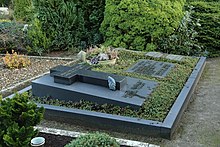
Niemöller lived in Wiesbaden until his death and lived in the house at Brentanostraße 3. Today it is the seat of the representative of the Evangelical Churches in Hesse (EKKW, EKHN, EKiR) at the Hessian state government . Martin Niemöller is buried on the grave of his family in the Old Evangelical Cemetery in Wersen in Lotte-Wersen near Osnabrück .
Honors
Niemöller was, among other things Wichernhaus plaque of the Inner Mission , the Lenin Peace Prize of the USSR (1966), the Grand Cross of the Federal Order of Merit (1970), the Albert Schweitzer Peace Medal, the German Peace Medal of the GDR in gold, the Carl-von-Ossietzky Medal (1983) of the International League for Human Rights . Honorary doctorates in Eden / USA, Budapest, Göttingen, Halifax / Chicago, New Delhi and Chicago and honorary citizenship of the city of Wiesbaden .
The Martin-Niemöller-Church in Nuremberg, the Martin-Niemöller-Haus (conference site of the Evangelical Academy Arnoldshain ), the Peace Center Martin-Niemöller-Haus in Berlin-Dahlem , the Martin-Niemöller-Haus in Jena and the Martin were named after him -Niemöller-Haus nursing home in Rüsselsheim as well as the Martin-Niemöller-Gesamtschule in Bielefeld , the Martin-Niemöller-Grundschule in Berlin-Neu-Hohenschönhausen , the upper secondary school Martin-Niemöller-Schule in Wiesbaden and the Martin-Niemöller-Schule in Riedstadt as well Martin Niemöller house in Westerkappeln-Velpe.
The street directory of Germany shows more than 30 streets, paths and squares that are named after Martin Niemöller.
On October 17, 1985, the film Martin Niemöller - What Would Jesus Say? A journey through a Protestant life (script and direction: Hannes Karnick and Wolfgang Richter; DVD title: Rebell against Will - The Century of Martin Niemöller ) performed for the first time.
On the occasion of his 100th birthday, a postage stamp was issued by the Deutsche Bundespost in 1992.
Since 2010, a touring award for peace-building and international understanding initiatives has been named Niemöllers, the Martin-Niemöller-Peace Dove . It was awarded to the Dachau Reconciliation Church in 2010 , to the contemporary history archive of Lake Braies in 2011 and to the Bolzano city archive in 2012 .
I kept silent
“When the Nazis brought the Communists in, I was silent; I wasn't a communist.
When they locked up the Social Democrats, I was silent; I wasn't a social democrat.
When they called the unionists, I was silent; I wasn't a trade unionist.
When they got me, there was no one left to protest. "
The Martin Niemöller Foundation regards this version as the "official" one, which historian Harold Marcuse questions. The 1986 publication in What would Jesus say about this , to which the foundation appeals, ignores the context in which Niemöller quoted himself (in an interview in 1976), namely as an answer to the question asked in 1974 why his generation did nothing, when Jewish Germans were arrested en masse during the 1938 pogroms . The editor of the 1986 work reprinted the version that was circulating in Germany in the 1970s, even though the order of the groups in Niemöller's answer was different. In speeches that Niemöller gave in 1946/47 and in the 1950s, he usually included “the Jews”. The quote is still wrongly reproduced today or according to a version that is not fixed in writing, for example (since 1965) with the addition of "When they brought the Catholics, I did not protest: I was not a Catholic".
The verse, which probably did not appear in the first version, but was added by Niemöller, at least after 1945, often after the third verse, is as follows:
“When they fetched the Jews, I was silent; I wasn't a Jew. "
Fonts (selection)
- From the submarine to the pulpit. Martin Warneck, Berlin 1934 (autobiography). Full text online. Accessed January 24, 2020
- with Otto Dibelius : The State Church is here! Memorandum from the Confessing Church. Druckhaus Ley & Wiegandt, Wuppertal-Barmen 1936.
- with Otto Dibelius: We call Germany to God. Martin Warneck, Berlin 1937.
-
“… To proclaim a gracious year of the Lord!” Six Dachau sermons. Munich 1946.
- in English: God is my Fuehrer. The last 28 sermons. Foreword by Thomas Mann . Philosophical Library , NY 1941.
- The legacy of the German resistance. In: Ricarda Huch : The silent uprising. Report on the resistance movement of the German people 1933–1945. Edited [and introduced] by Günther Weisenborn . Rowohlt, Hamburg 1953, pp. 11-12.
- Dahlem sermons. Critical edition. Edited by Michael Heymel . On behalf of the Central Archives of the Evangelical Church in Hesse and Nassau. Gütersloher Verlagshaus, Gütersloh 2011, ISBN 978-3-579-08128-1 .
- Joachim Perels (Ed.): Martin Niemöller. Conscience before reason of state. Selected Writings. Wallstein, Göttingen 2016, ISBN 978-3-8353-1700-0 .
- Bibliography. In: Biographisch-Bibliographisches Kirchenlexikon. Volume 6, Herzberg 1993, Col. 735-748.
- Thoughts on the way of the Christian Church . Gütersloher Verlagshaus, Gütersloh 2019 (edited by Alf Christophersen and Benjamin Ziemann ) ISBN 978-3-579-08544-9
literature
- James Bentley: Martin Niemöller. Oxford University Press 1984, ISBN 0-340-39273-8 .
- German: Martin Niemöller. A biography. Beck, Munich 1985. ISBN 3-406-30547-4 .
- Wolfgang Gerlach: When the witnesses were silent. 2nd Edition. Institute Church and Judaism, Berlin 1993, ISBN 3-923095-69-4 , p. 87 ff.
- Gerti Graff (ed.): On the way to the responsible community. The Protestant Church under National Socialism using the example of the Dahlem community. Pictures and texts from an exhibition in the Martin-Niemöller-Haus Berlin. 2nd Edition. Alektor, Stuttgart 1982, ISBN 3-88425-028-0 .
- Michael Heymel : Martin Niemöller. From naval officer to peace fighter . Lambert Schneider, Darmstadt 2017, ISBN 978-3-650-40196-0 .
- Carsten Nicolaisen: Niemöller, Martin. In: Biographisch-Bibliographisches Kirchenlexikon (BBKL). Volume 6, Bautz, Herzberg 1993, ISBN 3-88309-044-1 , Sp. 735-748.
- Carsten Nicolaisen: Niemöller, Emil Gustav Martin. In: New German Biography (NDB). Volume 19, Duncker & Humblot, Berlin 1999, ISBN 3-428-00200-8 , pp. 239-241 ( digitized version ).
- Jan Niemöller: History of a Grand Piano. NR-Verlag, Usingen 1998, ISBN 3-00-002388-7 .
- Matthias Schreiber: Martin Niemöller. 2nd Edition. Rowohlt, Reinbek 2008, ISBN 978-3-499-50550-8 .
- Dietmar Schmidt: Martin Niemöller. A biography. Radius, Stuttgart 1983, ISBN 3-87173-648-1 .
- Wolfram Wette : ahead of its time. Martin Niemöller's peace initiatives (1945–1955). In: Detlef Bald (ed.): Peace initiatives in the early days of the Cold War 1945–1955 (= Peace and War, 17). Essen 2010, pp. 227–241.
- Doris Borchmeyer: The Confessing Church and the foundation of the Evangelical Church in Hesse and Nassau, EKHN. Dissertation, University of Giessen, 2010 ( PDF ).
- Jürgen Schmidt: Martin Niemöller in the church fight. Leibniz-Verlag, Hamburg 1971, ISBN 3-87473-004-2 ( full text online )
- Benjamin Ziemann : Martin Niemöller. A life in opposition . German publishing house. Munich 2019 ISBN 978-3-421-04712-0
Web links
- Literature by and about Martin Niemöller in the catalog of the German National Library
- Works by and about Martin Niemöller in the German Digital Library
- Martin Niemöller in the German biography
- Newspaper article about Martin Niemöller in the 20th century press kit of the ZBW - Leibniz Information Center for Economics .
- Short biography of the German Resistance Memorial Center
- Dorlis Blume, Regina Haunhorst, Irmgard Zündorf: Martin Niemöller. Tabular curriculum vitae in the LeMO ( DHM and HdG ), as of January 15, 2016
- Wilhelm Niemöller : Martin Niemöller. In: Young Church . A magazine by European Christians. Volume 42, December 1981, p. 573 ff. Online in: Lebenshaus-Alb.de , March 6, 2009 (for his brother's 90th birthday)
- Martin Niemöller Foundation
- Harold Marcuse : Niemoeller Quotation Page. In: History. ucsb .edu , September 12, 2000, last updated on December 23, 2014
- Martin Niemöller in: Uboat.net
- Günter Gaus in conversation with Martin Niemöller. Transcript. In: Rundfunk Berlin-Brandenburg , October 30, 1963
- On the way to the responsible community , exhibition (describes Niemöller's work in the Berlin-Dahlem community during National Socialism)
- Martin Niemöller in the online exhibition Resistance !? Evangelical Christians under National Socialism
- Martin Niemöller: Pastor Niemöller DD to the Göttingen students: Speech given at the invitation of the Protestant student community on January 17, 1946 at St. Jacobi in Göttingen. January 17, 1946, accessed January 31, 2020 .
- Encyclopedia United States Holocaust Memorial Museum : Photo Gallery Martin Niemöller. Accessed January 31, 2020 .
- Google Arts & Culture: Photo gallery Martin Niemöller. Accessed January 31, 2020 .
- Niemöller, Emil Gustav Friedrich Martin. Hessian biography. (As of May 9, 2020). In: Landesgeschichtliches Informationssystem Hessen (LAGIS).
- Niemöller, Martin in the Frankfurt personal dictionary
Individual evidence
- ↑ Wolfgang Caesar: From the poor hireling to the superintendent - the ancestors of the theologian Martin Niemöller. In: Genealogy. Volume 64, 2015, pp. 612-631.
- ↑ Martin Niemöller: Festschrift for the 90th birthday , Heinz Kloppenburg, Martin Niemöller, Pahl-Rugenstein, 1982, ISBN 978-3-7609-0673-7 , p. 17.
- ↑ In: World War Commemoration. Materials for church services and community work. Proclamation Center of the Evangelical Church in Nassau, June 2014, p. 13. Digital copy PDF Updated on January 24, 2020
- ↑ Harald Bendert: The UC-Boats of the Imperial Navy 1914-1918 - Mine Warfare with U-Boats . Hamburg, Berlin and Bonn 2001, p. 171.
- ↑ Biography ( memento from August 5, 2012 in the web archive archive.today ) at the Martin-Niemöller-Stiftung
- ^ Benjamin Ziemann : Martin Niemöller as a völkisch-national student politician in Münster 1919 to 1923 , in: Vierteljahrshefte für Zeitgeschichte , issue 2, April 2019, pp. 209-234.
- ↑ Ernst Klee: The SA of Jesus Christ . The church under the spell of Hitler. Frankfurt a. M. 1989, p. 9.
- ^ Walter Görlitz: Model - Strategy of the Defensive. Limes-Verlag, Munich / Wiesbaden 1982, pp. 43, 57.
- ↑ Quoted in: Ulrich Kabitz: Notes. In: Dietrich Bonhoeffer : Bridal letters, cell 92. Dietrich Bonhoeffer - Maria von Wedemeyer 1943–1945. C. H. Beck, Munich 2006, ISBN 3-406-54440-1 , p. 260
- ↑ Martin Niemöller: Sentences on the Aryan question in the church. In: Young Church. Bi-monthly publication for Reformation Christianity; Volume 1, number 17, November 2, 1933, pp. 269–271
- ↑ Correspondence with Karl Barth. In: Bonhoeffer selection, Volume 2, Present and Future of the Church, 1933-1936. Gütersloher Taschenbücher, Siebenstern 150, Gütersloher Verlagshaus, Gerd Mohn, Chr. Kaiser Verlag, Munich 1970, pp. 92, 93.
- ↑ Dahlem Confession Synod in the exhibition On the way to the responsible community.
- ^ Sermon on Israel Sunday, 10th Sunday after Trinity, 1935 online . The quotation is often reproduced incompletely, namely interrupted at "avenge"; z. B. Daniel Jonah Goldhagen , Vollstrecker, 1998, edition 2012, p. 143, readable online
- ^ The trial against Martin Niemöller before the Berlin Special Court 1938, Historische Zeitschrift, 4/2018, p. 299 ff. Von Ziemann, Benjamin
- ↑ Hans Buchheim: A Nazi functionary for the Niemöller trial . (PDF; 4.8 MB). In: Vierteljahrshefte für Zeitgeschichte 3.1956, pp. 307–315.
- ↑ Hans-Otto Bredendiek: Martin Niemöller and the 800-year celebration in Gramzow , In: Communications of the Uckermärkisches Geschichtsverein zu Prenzlau. Issue 12, Eberswalde 2005, pp. 106–121.
- ↑ See the introductory commentary on a manuscript by Niemoller, in: Martin Niemöller, Alf Christophersen , Benjamin Ziemann (ed.), Thoughts on the Path of the Christian Church. Gütersloher Verlagshaus, Gütersloh 2019, 272 pages.
- ↑ Helga Grebing : The National Socialism. 18th edition. Günter Olzog Verlag, Munich 1964, p. 133.
- ↑ Clemens Vollnhals: The Evangelical Church between keeping tradition and reorientation. In: Martin Broszat, Klaus-Dietmar Henke, Hans Woller: From Stalingrad to currency reform, to the social history of upheaval in Germany. Oldenbourg, Munich 1990, p. 118 f.
- ↑ Clemens Vollnhals: The Evangelical Church between keeping tradition and reorientation. In: Martin Broszat, Klaus-Dietmar Henke, Hans Woller: From Stalingrad to currency reform. On the social history of upheaval in Germany. Oldenbourg, 1990, p. 118.
- ↑ a b Clemens Vollnhals: The Evangelical Church between keeping tradition and reorientation. In: Martin Broszat, Klaus-Dietmar Henke, Hans Woller: From Stalingrad to currency reform, to the social history of upheaval in Germany. Oldenbourg, Munich 1990, p. 119.
- ^ Manfred Gailus: Brother Ziegler. Die Zeit, No. 8 of February 15, 2007, p. 92; ders .: From Rosenberg's church fighter who believes in God to the pastor of Niemöllers who believes in Christianity. In: Journal of History, Issue 11/2006, Berlin (Metropol); Wolfgang Weissgerber: Too late, too apolitical, too little, u. a. Frankfurter Rundschau, January 19, 2007.
- ↑ rearmament in the exhibition: On the way to mature community
- ^ So Gerhard Gronauer: The State of Israel in West German Protestantism. Perceptions in church and journalism from 1948 to 1972 (= AKIZ.B 57). Göttingen 2013, pp. 181–183.
- ↑ Quoted from Gerhard Gronauer: The State of Israel in West German Protestantism. Perceptions in church and journalism from 1948 to 1972 (= AKIZ.B 57). Göttingen 2013, p. 182.
- ↑ The question “What would Jesus say about this?” Was his compass ( memento from November 9, 2013 in the Internet Archive ), epd report from March 4, 2009 on www.ekd.de. Retrieved January 23, 2013.
- ↑ A Journey through a Protestant Life. Martin Niemöller: What would Jesus say about that? Movie from 1985 on www.imdb.com (link checked on November 9, 2013).
- ↑ Martin-Niemöller-Haus Berlin-Dahlem. Retrieved June 9, 2019 .
- ^ Dove of peace for the Dachau Reconciliation Church
- ↑ Press release from the South Tyrolean Education Authority
- ^ Archivalia: Bolzano city archives receive dove of peace
- ↑ a b Sources: This is how Niemöller wrote it. It has been modified very often. Martin Niemöller Foundation
- ↑ Harold Marcuse: The Origin and Reception of Martin Niemöller's Quotation “First they came for the communists…” (PDF) July 31, 2014, pp. 16–18 , accessed on April 9, 2018 (English).
- ↑ a b Harold Marcuse: The Origin and Reception of Martin Niemöller's Quotation “First they came for the communists…” (PDF) July 31, 2014, p. 9 , accessed on April 9, 2018 (English).
- ↑ Evangelical day care center Martin Niemöller of the Evangelical Church District Hamm: A famous quote from Martin Niemöller .
- ^ Sources: Quotation from the Rev. Martin Niemöller Natzweiler Memorial Site
- ↑ Sources: The story of Pastor Martin Niemöller (1892-1984) TalkTogether - newspaper by and for migrants and non-migrants
| personal data | |
|---|---|
| SURNAME | Niemöller, Martin |
| ALTERNATIVE NAMES | Niemöller, Emil Gustav Friedrich Martin (full name) |
| BRIEF DESCRIPTION | German theologian, Christian resistance fighter |
| DATE OF BIRTH | January 14, 1892 |
| PLACE OF BIRTH | Lippstadt |
| DATE OF DEATH | March 6, 1984 |
| Place of death | Wiesbaden |
